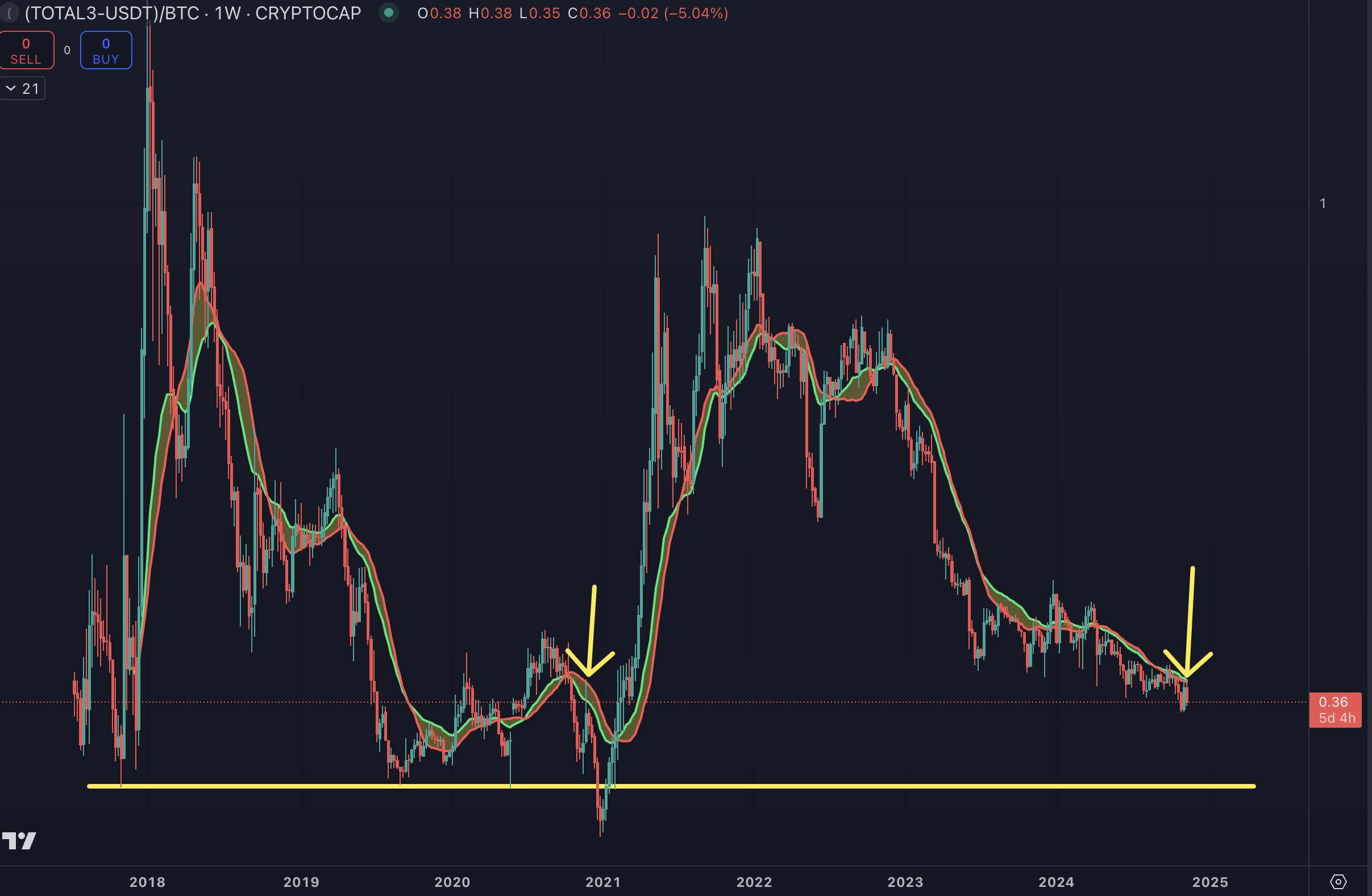Bitcoin’s Dominance Expected to Outshine Altcoins Through 2024, Says Analyst
14.11.2024 20:30 1 min. read Alexander Zdravkov
Crypto analyst Benjamin Cowen predicts that Bitcoin (BTC) is poised to outperform altcoins for the remainder of 2024.
With Bitcoin’s market dominance hovering around 60%, Cowen suggests that altcoins could continue to struggle against the leading cryptocurrency.
He pointed out that the TOTAL3 chart, which tracks the market cap of all cryptocurrencies excluding Bitcoin, Ethereum, and stablecoins, appears to be on the verge of declining, a pattern reminiscent of what occurred in 2020.
Cowen further explained that historically, Bitcoin’s dominance tends to increase in the final quarter of halving years, and with BTC’s current performance surpassing many top altcoins, this trend may persist into the new year.
He also mentioned that, although dominance may eventually decrease in 2025, it is reasonable to expect Bitcoin to maintain strong dominance through the end of 2024, possibly until January.
In addition, Cowen highlighted an emerging correlation between Bitcoin’s price movements and the US dollar index (DXY), something that contradicts the typical narrative of an inverse relationship.
He recalled a similar occurrence in Q4 2016, where both Bitcoin and the DXY rose in tandem, suggesting that such a correlation is not unusual, despite prevailing assumptions in the market.
-
1
Is a New Altcoin Cycle Brewing in 2025?
13.06.2025 12:00 1 min. read -
2
Pi Token Squeezes Higher After Brief Collapse—Path to $10 Still Murky
16.06.2025 14:00 1 min. read -
3
Solana Exchange Balances Surge as Bearish Signals Grow
13.06.2025 18:25 1 min. read -
4
Cardano Moves Toward Ripple Asset Integration as Hoskinson Teases DeFi Expansion
15.06.2025 11:00 2 min. read -
5
SEC Postpones Decision on Franklin Templeton Ethereum ETF Staking Proposal
17.06.2025 8:00 1 min. read
Which Crypto ETFs Could Get SEC Approval in 2025? Here Are the Chances
With the U.S. Securities and Exchange Commission (SEC) already greenlighting spot Bitcoin and Ethereum ETFs, attention is now turning to the next wave of crypto-backed exchange-traded funds.
UniCredit to Launch Structured Product Tied to BlackRock’s Spot Bitcoin ETF
European banking giant UniCredit is preparing to offer its professional clients a new investment product linked to BlackRock’s spot Bitcoin ETF (IBIT), according to a report by Bloomberg.
Top Trending Cryptocurrencies Today
As crypto markets navigate another week of volatility and shifting sentiment, traders are increasingly turning their attention to emerging altcoins and high-momentum tokens.
American State Bans Crypto Investments and Payments in Sweeping New Law
Connecticut has officially distanced itself from government adoption of digital assets like Bitcoin. On June 30, Governor Ned Lamont signed House Bill 7082 into law, placing sweeping restrictions on how the state and its agencies can engage with cryptocurrencies.
-
1
Is a New Altcoin Cycle Brewing in 2025?
13.06.2025 12:00 1 min. read -
2
Pi Token Squeezes Higher After Brief Collapse—Path to $10 Still Murky
16.06.2025 14:00 1 min. read -
3
Solana Exchange Balances Surge as Bearish Signals Grow
13.06.2025 18:25 1 min. read -
4
Cardano Moves Toward Ripple Asset Integration as Hoskinson Teases DeFi Expansion
15.06.2025 11:00 2 min. read -
5
SEC Postpones Decision on Franklin Templeton Ethereum ETF Staking Proposal
17.06.2025 8:00 1 min. read



